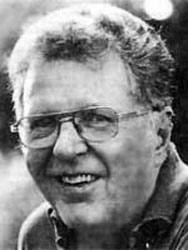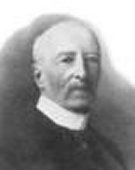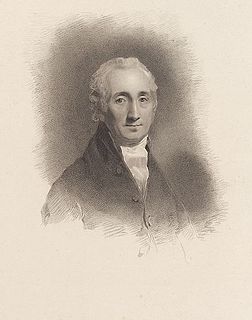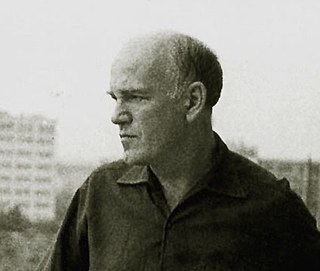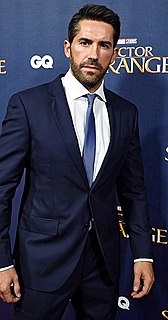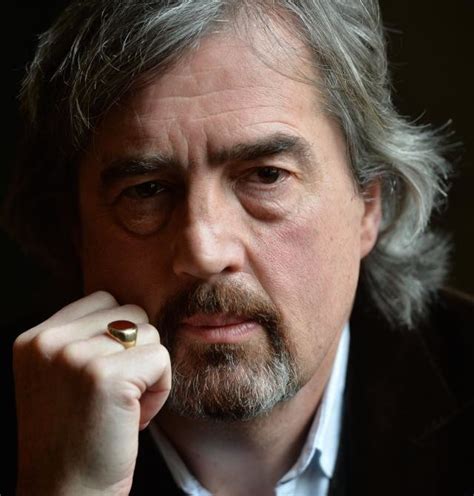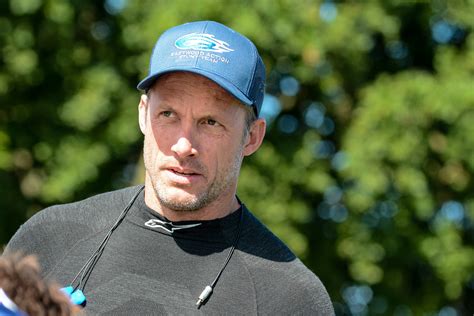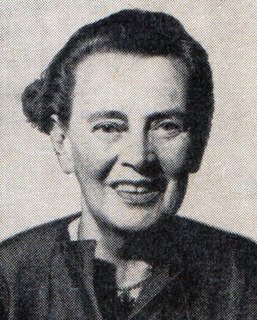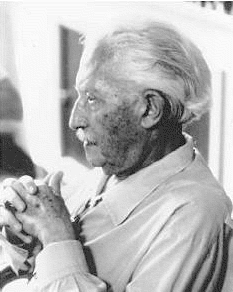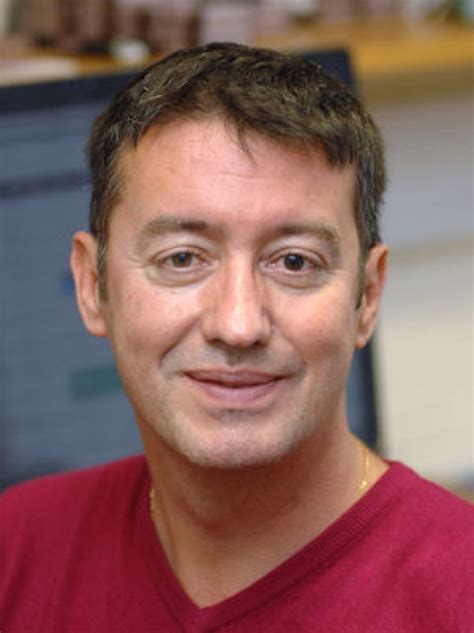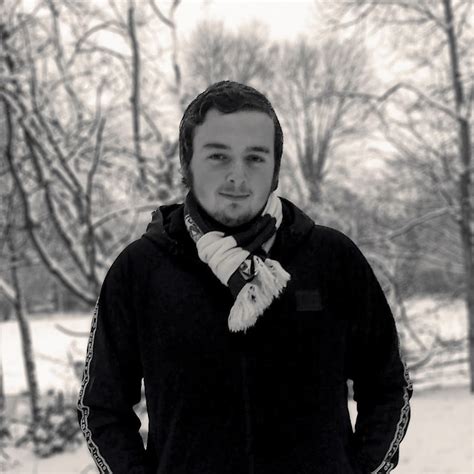Top 533 Sequence Quotes & Sayings - Page 9
Explore popular Sequence quotes.
Last updated on April 16, 2025.
However the machine would permit us to test the hypothesis for any special value of n. We could carry out such tests for a sequence of consecutive values n=2,3,.. up to, say, n=100. If the result of at least one test were negative, the hypothesis would prove to be false; otherwise our confidence in the hypothesis would increase, and we should feel encouraged to attempt establishing the hypothesis, instead of trying to construct a counterexample.
Listen, are we helpless? Are we doomed to do it again and again and again? Have we no choice but to play the Phoenix in an unending sequence of rise and fall? Assyria, Babylon, Egypt, Greece, Carthage, Rome, the Empires of Charlemagne and the Turk: Ground to dust and plowed with salt. Spain, France, Britain, America—burned into the oblivion of the centuries. And again and again and again. Are we doomed to it, Lord, chained to the pendulum of our own mad clockwork, helpless to halt its swing? This time, it will swing us clean to oblivion.
Earlier this week ... scientists announced the completion of a task that once seemed unimaginable; and that is, the deciphering of the entire DNA sequence of the human genetic code. This amazing accomplishment is likely to affect the 21st century as profoundly as the invention of the computer or the splitting of the atom affected the 20th century. I believe that the 21st century will be the century of life sciences, and nothing makes that point more clearly than this momentous discovery. It will revolutionize medicine as we know it today.
With a 660-page book, you don't read every sentence aloud. I am terrified for the poor guy doing the audio book. But I do because I think we hear them aloud even if it's not an audio book. The other goofy thing I do is I examine the shape of the words but not the words themselves. Then I ask myself, "Does it look like what it is?" If it's a sequence where I want to grab the reader and not let the reader go then it needs to look dense. But at times I want the reader to focus on a certain word or a certain image and pause there.
For a woman as for a man, marriage might enormously help or devastatingly hinder the growth of her power to contribute something impersonally valuable to the community in which she lived, but it was not that power, and could not be regarded as an end in itself. Nor, even, were children ends in themselves; it was useless to go on producing human beings merely in order that they, in their sequence, might produce others, and never turn from this business of continuous procreation to the accomplishment of some definite and lasting piece of work.
Watching Michael Jackson was like taking a history lesson and a lesson on the future at the same time. If that weren’t enough, Michael then went and single-handedly revolutionized music videos. It’s amazing that today, some twenty-five years later, everyone who makes a pop music video still feels obligated to include a 'group dance' sequence like the one Michael pioneered in 'Beat It'. That’s how influential and ahead of the times he was.
Comics are a "young" art form, and there is much confusion as to how to treat them. Images have more immediate impact than words, and it is not every reader who can be convinced to relax into experiencing the work for what it is - not words and pictures, but a different form, where the narrative is propelled by the blending of image, word and sequence, and where no element can be extricated and have the same meaning by itself. When this art is shown in a gallery, its "thingness" is called to attention, it is no longer experienced as "story," but rather as an artifact of the artist's process.
High culture is nothing but a child of that European perversion called history, the obsession we have with going forward, with considering the sequence of generations a relay race in which everyone surpasses his predecessor, only to be surpassed by his successor. Without this relay race called history there would be no European art and what characterizes it: a longing for originality, a longing for change. Robespierre, Napoleon, Beethoven, Stalin, Picasso, they're all runners in the relay race, they all belong to the same stadium.
My mind is a centre of Divine operation. The Divine operation is always for expansion and fuller expression, and this means the production of something beyond what has gone before, something entirely new, not included in past experience, though proceeding out of it by an orderly sequence of growth. Therefore, since the Divine cannot change its inherent nature, it must operate in the same manner in me; consequently in my own special world, of which I am the centre , it will move forward to produce new conditions, always in advance of any that have gone before.
I did Lois & Clark: The New Adventures Of Superman. It was a sequence where the president got captured and they made a doppelgänger of the president who was kind of goofy. They were Second City people who were the producers and writers, and they told my agent, "Well, we know Fred can do the kind of goofy, but we're not sure he can do be the straight president, kind of the Clinton-esque." So I really got my back up and I called my agent and I said, "Goddammit, I insist that I go in and read." And I did a great job and I got the part.
The average age of the world's great civilizations has been two hundred years. These nations have progressed through the following sequence: from bondage to spiritual faith, from spiritual faith to great courage, from courage to liberty, from liberty to abundance, from abundance to selfishness, from selfishness to complacency from complacency to apathy, from apathy to dependency, from dependency back to bondage.
The saved sinner is prostrate in adoration, lost in wonder and praise. He knows repentance is not what we do in order to earn forgiveness; it is what we do because we have been forgiven. It serves as an expression of gratitude rather than an effort to earn forgiveness. Thus the sequence of forgiveness and then repentance, rather than repentance and then forgiveness, is crucial for understanding the gospel of grace.
Much as I admire Tolkien, I once again always felt like Gandalf should have stayed dead. That was such an incredible sequence in Fellowship of the Ring when he faces the Balrog on the Khazad-dûm and he falls into the gulf, and his last words are, "Fly, you fools." What power that had, how that grabbed me. And then he comes back as Gandalf the White, and if anything he's sort of improved. I never liked Gandalf the White as much as Gandalf the Grey, and I never liked him coming back. I think it would have been an even stronger story if Tolkien had left him dead.
I am not a complete idiot, but whether from weakness or laziness have no talent for thinking. I know only how to reflect: I am a mirror. Logic does not exist for me. I float on the waves of art and life and never really know how to distinguish what belongs to the one or the other or what is common to both. Life unfolds for me like a theatre presenting a sequence of somewhat unreal sentiments; while the things of art are real to me and go straight to my heart.
I like the saying: "The world is as you are." And I think films are as you are. That's why, although the frames of a film are always the same - the same number, in the same sequence, with the same sounds - every screening is different. The difference is sometimes subtle but it's there. It depends on the audience. There is a circle that goes from the audience to the film and back. Each person is looking and thinking and feeling and coming up with his or her own sense of things. And it's probably different from what I fell in love with.
The difference between the novice and the master is simply that the novice has not learnt, yet, how to do things in such a way that he can afford to make small mistakes. The master knows that the sequence of his actions will always allow him to cover his mistakes a little further down the line. It is this simple but essential knowledge which gives the work of a master carpenter its wonderful, smooth, relaxed, and almost unconcerned simplicity.
It was weird working with all of them - Stallone, Schwarzenegger, Bruce Willis, Chuck Norris. There's a sequence in the movie where myself and Jean-Claude Van Damme are running through this airport and there's this silhouette behind this big screen - it smashes, and there you see Schwarzenegger, Stallone, and Bruce Willis all firing their weapons at me and Jean-Claude. It's kind of surreal when you think about it, the three '80s icons of action movies, unloading as many bullets as they could at us. It's pretty crazy.
It is a mistake to talk about the artist looking for his subject. In fact, the subject grows within him like a fruit and begins to demand expression. It is like childbirth. The poet has nothing to be proud of. He is not master of the situation, but a servant. Creative work is his only possible form of existence, and his every work is like a deed he has no power to annul. For him to be aware that the sequence of such deeds is due and ripe, that it lies in the very nature of things, he has to have faith in the idea; for only faith interlocks the system of images for which read system of life.
It is one of the paradoxes of parenting, and often a painful paradox, that even as our children need us for love and trust, they also need us for honest differing. It's not only over limits and rules...[but also] about what we represent in the way of culture, traditions, and values. We owe it to our children to let them know what we believe, and if they differ with us, we owe it to them to be honest adversaries, for it is through this honest confrontation that children can grow into adults who have a firm sense of their place in the sequence of the generations.
One of the things that I've worked my way out of doing, and I knew that I needed to, was comparing myself to other people. That just poisins everything. It all of a sudden dtermines even clothes you're going to choose to wear that day or what you're going to do with a music production or how you're going to sequence it. It poisinseverything. Your real job in the world is to be you. Comparing yourself to other people I think that hurt me more than anything. Allowing myself to go there so much in my head hurt me.
He loved telling stories. He had been everywhere in the world. The northwest frontier, the landscape of the Hindu Kush, was one of the great landscapes of my childhood because he used to evoke it with his stories. He taught me the sequence of ranks in the British army when I was about eight. I was in the bed with him while he told me everything about his life - except, probably, the real things, because of course you couldn't go there.
Our main source of psychic energy in the future will depend on our ability to understand this symbol of evolution in an acceptable context of interpretation. Only in the context of an emergent universe will the human project come to an integral understanding of itself. We must, however, come to experience the universe in its psychic as well as in its physical aspect. We need to experience the sequence of evolutionary transformations as moments of grace, and also as celebration moments in our new experience of the sacred.
Consider a movie: it consists of thousands upon thousands of individual pictures, and each of them makes sense and carries a meaning, yet the meaning of the whole film cannot be seen before its last sequence is shown. However, we cannot understand the whole film without having first understood each of its components, each of the individual pictures. Isn't it the same with life? Doesn't the final meaning of life, too, reveal itself, it at all, only at its end, on the verge of death?
... for our sake loosing within Himself the bonds of bodily birth, He granted us through spiritual birth, according to our own volition, power to become children of God instead of children of flesh and blood if we have faith in His Name (cf. Jn. 1:12-13). For the Savior the sequence was, first of all, incarnation and bodily birth for my sake; and so thereupon the birth in the Spirit through baptism, originally spurned by Adam, for the sake of my salvation and restoration by grace, or, to describe it even more vividly, my very remaking.
Suppose that the organism is given the problem of determining the analysis of a stimulus at a certain level of representation - e.g., the problem of determining which sequence of words a given utterance encodes. Since, in the general case, transducer outputs underdetermine perceptual analyses, we can think of the solution of such problems as involving processes of nondemonstrative inference. In particular, we can think of each input system as a computational mechanism which projects and confirms a certain class of hyputheses on the basis of a certain body of data.
The worst thing that can happen is when you have gone weeks and months into elaborate sequences and the storyline of the film changes and you find out they don't need it. Sometimes you don't shoot those sequences, or they have been shot and then get edited out of the sequence you've shot gets changed and needs to be redone. That can be hard. It's not heartbreaking, but you do tend to think, "Och, all that work and effort." But that's filming, you know? You put all of these modular things into the pot, and sometimes they don't all get used.
In what touches their social convictions, most persons do not think. The threat of change, with all it suggests to them in the loss of social and economic privilege, alarms so deeply that they are incapable of unprejudiced thought. They seem to themselves to be thinking, with lucidity and fairness, but since they start from the conviction that change must undoubtedly be for the worse or from settled grief at the thought of losing what is old and lovely, they are doing no more than following a logical sequence of ideas from a false premise.
This life as you now live it and have lived it, you will have to live once more and innumerable times more; and there will be nothing new in it, but every pain and every joy and every thought and sigh and everything unutterably small or great in your life will have to return to you, all in the same succession and sequence - even this spider and this moonlight between the trees, and even this moment and I myself. The eternal hourglass of existence is turned upside down again and again, and you with it, speck of dust!
It's funny, because it's like the fight when you watch it, it's probably going to be like five minutes, but it's taken us like a month to shoot it so I think what was really interesting was that instead of going through an entire fight sequence, you're doing one or two moves over and over and over, so I'd say it's less exhausting than actually training, because you're not really constantly going over the choreography, like the whole entire thing with everybody. You're just doing that one part that they need in the shot.
Emma Watson was saying the other day that when Helena Bonham Carter was becoming Hermione, or trying to become her for the polyjuice-potion sequence, she was trying to take on Emma's mannerisms, and she was asking Emma questions like, "What's Hermione's favorite color?" Because she wanted to absorb all this information and to know, in here touches temple what she was like. And as I've tried to develop as an actor, I see that these things, however much they seem insignificant... By knowing what's Neville's Longbottom favorite Beatles song, you can know so much!
Historical chronology, human or geological, depends... upon comparable impersonal principles. If one scribes with a stylus on a plate of wet clay two marks, the second crossing the first, another person on examining these marks can tell unambiguously which was made first and which second, because the latter event irreversibly disturbs its predecessor. In virtue of the fact that most of the rocks of the earth contain imprints of a succession of such irreversible events, an unambiguous working out of the chronological sequence of these events becomes possible.
Every one knows that the heavenly bodies move in certain paths in relation to each other with seeming consistency and regularity which we call [physical] law. ... No one attributes freewill or motive to the material world. Is the conduct of man or the other animals any more subject to whim or choice than the action of the planets? ... We know that man's every act is induced by motives that led or urged him here or there; that the sequence of cause and effect runs through the whole universe, and is nowhere more compelling than with man.
A man must be big enough to admit his mistakes, smart enough to profit from them, and strong enough to correct them. This sequence is something that all achievers have in common. They do not see a mistake is as their failure; rather it is simply a learning experience. Achievers view a mistake as an opportunity to do something over again and do it right the second time. A mistake is simply the price they pay to achieve success.
I think everybody should see ('The Star Wars Holiday Special') to realize how bad something can be. There are some cool things in there, but it's two hours long, and you could probably cut it down to about two minutes and twelve seconds of cool material. The animated Boba Fett sequence is great, and there's some cool stuff, but overall, the whole format of a variety show in the 'Star Wars' universe is just a train wreck.
Earth as we know it came into being through its four great components: land, water, air, and life, all interacting in the light and energy of the sun. Although there was a sequence in the formation of the land sphere, the atmosphere, the water sphere, and the life sphere, these have so interacted with one another in the shaping of the Earth that we must somehow think of these as all present to one another and interacting from the beginning.
Dantes passed through all the stages of torture natural to prisoners in suspense. He was sustained at first by that pride of conscious innocence which is the sequence to hope; then he began to doubt his own innocence, which justified in some measure the governor's belief in his mental alienation; and then, relaxing his sentiment of pride, he addressed his supplications, not to God, but to man. God is always the last resource. Unfortunates, who ought to begin with God, do not have any hope in him till they have exhausted all other means of deliverance.
Language is a theme in the whole book, no? I mean it ends with the title poem about words are all we have. I guess midrash makes sense. How does it change in the course of the sequence? Well, God is into No and into Stasis/Nouns. Adam and Eve, in order to be in this world (and get this world going) must choose verbs. Which is to gain sex but also to choose death and all else that goes with change. To choose becoming over being.
I don't want to fetishize the past. I want there to be a natural sequence coming out of a synthesis of the ideas and information that I gather together as a result of looking at things that are in the world. I'm trying to bring forward signs or signals based on what I see and my responses to these things. I'm trying to leave a trail that will be useful to other people in the future. It has to do with making something that contains a synthesis of the information, and then consequently to make one's deliberations visible, to allow other people to follow them. That's how I see my role.
It's all about respect; he's looking for respect from his buddies. In the last one he just wanted to hang out, to be part of the group, but this time he wants more from his friends. And without giving the story away, he finally gets something that he has been looking for when the mini sloths kidnap him and take him to their tribal area. He gets to be the Fire King and they worship him and there is an amazing scene with a "call and response" sequence in the style of Cab Callow [the legendary American jazz singer and band leader] between him and his audience.
The calamities of tragedy do not simply happen, nor are they sent; they proceed mainly from actions, and those the actions of men.We see a number of human beings placed in certain circumstances; and we see, arising from the co-operation of their characters in these circumstances, certain actions. These actions beget others, and these others beget others again, until this series of inter-connected deeds leads by an apparently inevitable sequence to a catastrophe.
We normally think of history as one catastrophe after another, war followed by war, outrage by outrage - almost as if history were nothing more than all the narratives of human pain, assembled in sequence. And surely this is, often enough, an adequate description. But history is also the narratives of grace, the recountings of those blessed and inexplicable moments when someone did something for someone else, saved a life, bestowed a gift, gave something beyond what was required by circumstance.
These same experiences make of the sequence of life cycles a generational cycle, irrevocably binding each generation to those that gave it life and to those for whose life it is responsible. Thus, reconciling lifelong generativity and stagnation involves the elder in a review of his or her own years of active responsibility for nurturing the next generations, and also in an integration of earlier-life experiences of caring and of self-concern in relation to previous generations.
I got a phone call from George Miller [the director] asking me to play this role. We sat down and he showed me on his computer a documentary-type montage sequence of real penguins swimming, in an Esther Williams synchronized sort of way, and doing things I have never seen them do. Then he explained his vision of the film, asked me to read the script and to voice the character. I was cast a little bit later, and he let me do the singing as well!
I am aware that the conclusions arrived at in this work will be denounced by some as highly irreligious; but he who denounces them is bound to show why it is more irreligious to explain the origin of man as a distinct species by descent from some lower from, through the laws of variation and natural selection, than to explain the birth of the individual through the laws of ordinary reproduction. The birth both of the species and of the individual are equally parts of that grand sequence of events, which our minds refuse to accept as the result of blind chance.
A completed book exists in its entirety, although we humans read it in a time sequence from the beginning to the end. Just as an author does not write the first chapter, and then leave the others to write themselves, So God's creativity is not to seem as uniquely confined to, or even especially invested in, the event of the Big Bang. Rather his creativity has been seen as permeating equally all space and all time: his role as Creator and Sustainer merge.
This element of surprise or mystery — the detective element as it is sometimes rather emptily called — is of great importance in a plot. It occurs through a suspension of the time-sequence; a mystery is a pocket in time, and it occurs crudely, as in "Why did the queen die?" and more subtly in half-explained gestures and words, the true meaning of which only dawns pages ahead. Mystery is essential to a plot, and cannot be appreciated without intelligence.
In the final analysis the hierarchic pattern is nothing like the straightforward witness for organic evolution that is commonly assumed. There are facets of the hierarchy which do not flow naturally from any sort of random undirected evolutionary process. If the hierarchy suggests any model of nature it is typology and not evolution. How much easier it would be to argue the case for evolution if all nature's divisions were blurred and indistinct, if the systema naturalae was largely made up of overlapping classes indicative of sequence and continuity.
I thought I could start over, you see. But now I know you can never start over. Not really. You think you have control, but you are like a fly in somebody else's web. Sometimes I think that's why I like accounting. All day, you are only dealing with numbers. You add them, multiply them, and if you are careful, you will always have a solution. There's a sequence there. An order. With numbers, you can have control.
I've never been funny. I don't think I'm funny. People say I'm funny. I go, 'No. No. I'm not.' But again, knowing what it means to film on a TV show and on film, you have to repeat, repeat, repeat. You have to do the same thing a number of times if you're filming a sequence. And to carry that energy in a comedic mode, would be a challenge that I really would frightfully scared, but I'd have to buck up and pull up my bootstraps and say, 'I can do this. Let's figure it out.'
Because you are obsessed with the idea of past, present, and future, you are forced to think of reincarnations as strung out one before the other. Indeed we speak of past lives because you are used to the time sequence concept... You have dominant egos, all part of an inner identity, dominant in various existences. But the separate existences exist simultaneously. Only the egos involved make the time distinction... a thousand years in your past or in your future - all exist now.
The way in which the photograph records experience is also different from the way of language. Language makes sense only when it is presented as a sequence of propositions. Meaning is distorted when a word or sentence is, as we say, taken out of context; when a reader or listener is deprived of what was said before, and after. But there is no such thing as a photograph taken out of context, for a photograph does not require one. In fact, the point of photography is to isolate images from context, so as to make them visible in a different way.
If I could get every single cancer genome sequence that has been sequenced; if I could ever put it in one repository, we have the capacity to do a million billion calculations per second. We'll be able to find out more in 10 minutes more than it would take 10 Nobel laureates 10 years to find out about the patterns of cancer and the cures for cancer.


